本文目录
whether if在名词性从句的用法
名词性从句就是句子担任名词性的成分,如主语,宾语,表语,同位语。它包括主语从句、宾语从句、表语从句和同位语从句。
1. 主语从句
(1)What he said is true.
(2)When they will arrive is not known yet.
(3)That he succeeded in doing the experiment was encouraging.
(4)Whether he will accept the invitation remains a secret.
(5)It is important that we should learn English well.
2. 宾语从句
(1)I don't know if he has done the work.
(2)Did he say that he liked football ?
(3)They expected that they would be given another chance.
(4)The girl told me that she had longed to visit China.
3. 表语从句
(1)The question is whether we have enough time to do the experiment again.
(2)His greatest wish was that someday he would become a general.
(3)His suggestion was that we should discuss the plan carefully.
(4)My question is when they can finish the work.
4. 同位语从句
(1)You have no idea how eager they are to know the result.
(2)He made a suggestion that the work should be given to him.
(3)Have you heard the news that Premire Wen visited our school last Friday ?
(4)The fact that he got full mark in the composition made his parents very happy.
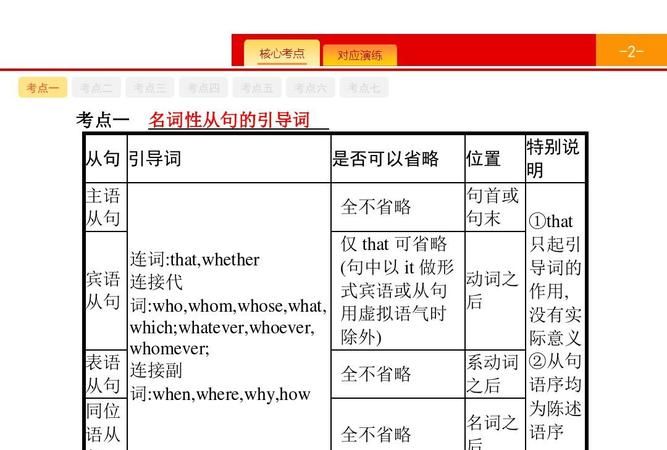
名词性从句规则
名词性从句
一. 什么叫“名词性从句”?名词性从句在功能上相当于名词
His job is important. I don’t like his job.
主语 宾语
What he does is important. I don’t like what he does every day.
This is his job. We students should study hard.
表语 同位语
This is what he does every day. I don’t know about the fact that he is a teacher.
相关概念:
1.名词:表示人或事物的名称的词
2.名词的句法作用:名词在句中主要作主语,宾语,表语和同位语。另外还可以作定语,状语。
3.名词性从句:在英语的句子结构中,本来该由名词充当的主 语、宾语、表语和同位语,由一个句子来充当,这个句子就叫:名词性从句。
二、 名词性从句的种类
1.When we will start is not clear.主语从句
2.Mrs Black won’t believe that her son has become a thief.宾语从句
3. My idea is that we should do it right now.表语从句
4.I had no idea that you were her friend.同位语从句
三、常见引导词:
连接词 : that、 if、 whether
连接代词 :who、 whose、 what、which
连接副词: when、 where、why、how、 how long
各种连接词的用法:
连接词 that、whether、if 不在它们引导的主语从句 中充当句子成分。
1. whether引导主语从句时,既可以直接位于句首,也可以位于句末;if 引导主语从句时只能用于it作形式主语的从句中。whether可以与or not连用,if则不行.
2. 连接代词who、whose、what、 which等都在句子中 担当一个句子成 分。比如:主语、宾语、定语等等。
3. 关系副词when、where、how、how long等分别在句子中作时间状语、地点状语、方式状语等等。
四、名词性从句七大常考考点:
考点1:连接词: that 与 what 的区别
That (a new teacher will come to our school ) is true .
What we can’t get seems better than what we have .
that 只起连接作用,无意义,在从句中不充当任何成分 what 既有连接作用, 又要在从句中作成分( 主语,宾语, 表语)(… 的东西;物;话;时间;地点;人物;数目等不同概念)
what (什么) / which ( 表选择, 哪一个)
1. ---Do you know____what____Mr Black’s address is ?
---He may live at No. 18 or No. 19 of Bridge Street. I’m not sure of ______which___.
2. I read about it in some book or other, does it matter ___which____ it was?
考点 2 :it作形式主语,形式宾语的用法
☺ it 作形式主语
1. It is a pity that he made such a mistake.
2.他来不来不重要。
Whether he will come or not doesn’t matter.=It doesn't matter whether he will or not.
It is well known/reported/ thought/said that…
It is clear/necessary/certain/true that…
It is a pity/a shame/an honor that…
It doesn’t matter whether…
It seems that…
It happens that…
☺. it 作形式宾语
(1) make /find/ feel / consider / think it + adj / n + that… / to do…
(2) it 指代后面从句所叙述的内容, 常用于这些动词后, like/dislike/love/hate /appreciate/make+it 后常跟if 或when从句
I hate it when people laugh at the old
(3) depend on it that….
1. I like __C_ in the autumn when the weather is clear and bright.
A. this B. that C. it D. one
2.You may depend on __C__ that you parents will help you whenever you need it.
A.them B. yourself C. it D. me
考点3 语序问题
★在名词性从句中,除了关联词要提到句首之外,一律要用陈述句语序
4.What time do you think _B_?
A.will Besty come here B.Besty will come here
C.is Besty coming here D.can Besty get here
疑问词+do you think\suggest\believe\suppose …+陈述语序
考点4 同位语从句和定语从句的区别
同位语从句一般跟在名词fact, news, promise, truth, belief, thought, idea, answer, information, knowledge, doubt, hope, law, opinion, plan, suggestion后面, 用以说明或解释前面的名词的内容.
定语从句:对先行词起修饰限制作用
The news that she passed the exam excited her parents . 同位语从句
解释说明;that在从句中不充当成分,但是不能省。
The news that we know from her excited all of us .
修饰限定;that在从句中有成分、作宾语时可以省。
判断方法:同位语从句可以变成表语从句。
1.The suggestion that he should not go there is of great value.
2. The suggestion that he made is of great value.
3.The fact that he won the first place can’t be denied.
4.The fact that he told me excited me.
注: 1. 同位语从句多用that 引导
2. 在have no idea 之后常用wh-引导同位语从句.
I have no idea where he has gone.
I have no idea when he did it.
I have no idea what he did.
考点5.选择填空
Whoever,whatever等引导的名词性从句不含有疑问意义,相当于名词后加一个定语从句,而what,who等引导的名词性从句都含有疑问意义。
高考题选萃
注:wh-ever 既可引导名词性从句
又可引导让步状语从句,no matter wh- 只引导让步状丛
3. It is generally considered unwise to give a child ___B_ he or she wants.
A. however B. whatever C. whichever D. whenever
考点6.whether 与 if 均为 “是否” 的意思。但在下列情况下,whether 不能被 if 所取代:
1.不是it做形式主语的主语从句
Whether he will come is unknown.
2. 表语从句,如:The question is whether you should accept it.
3. 同位语从句,如:The question whether he’ll attend the meeting is not decided.
4.在介词后:如:I’m not interested in whether they’ll go or not.
It depends on whether we have got enough money.
5. 直接跟不定式连用,如:She hasn’t decided whether to go or not.
用if 或whether 填空
1.___A__ we’ll go camping tomorrow depends on the weather.
A. If B.Whether
C. That D.Where
考点7虚拟语气问题
1.在order,suggest(建议),demand,request,advise,insist(坚持应该)等所接的宾语从句中用should 型虚拟语气。should 常省略。
2.在order,suggestion等名词后同位语从句,表语从句中用should 型虚拟语气,可省略should
3.在as if,as though引导的表语从句中,在必要的情况下应用过去式虚拟语气。
4.在主语从句中用来表示惊奇、不相信、惋惜、理应如此等,谓语动词用虚拟语气“(should) +do”,常用的句型有:(1)It is necessary (important, natural, strange, etc.) that...
(2) It is a pity(a shame, no wonder, etc.) that...
(3) It is suggested (requested, proposed, desired, etc.) that...如: It is strange that she (should) think so.
wish后,从句中的时态在原本的时态上退一步
I wish that I __B__that film star yesterday.
A saw B. had seen C would see D has seen
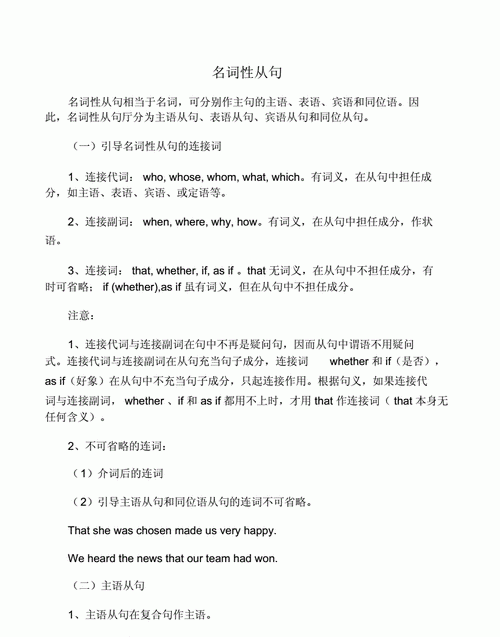
英语名词性从句的用法总结
名词性从句就是句子担任名词性的成分,如主语,宾语,表语,同位语。它包括主语从句、宾语从句、表语从句和同位语从句。
1. 主语从句
(1)What he said is true.
(2)When they will arrive is not known yet.
(3)That he succeeded in doing the experiment was encouraging.
(4)Whether he will accept the invitation remains a secret.
(5)It is important that we should learn English well.
2. 宾语从句
(1)I don't know if he has done the work.
(2)Did he say that he liked football ?
(3)They expected that they would be given another chance.
(4)The girl told me that she had longed to visit China.
3. 表语从句
(1)The question is whether we have enough time to do the experiment again.
(2)His greatest wish was that someday he would become a general.
(3)His suggestion was that we should discuss the plan carefully.
(4)My question is when they can finish the work.
4. 同位语从句
(1)You have no idea how eager they are to know the result.
(2)He made a suggestion that the work should be given to him.
(3)Have you heard the news that Premire Wen visited our school last Friday ?
(4)The fact that he got full mark in the composition made his parents very happy.
名词性从句主要从以下几点把握:
1. 语序。从句一定要是陈述语序。如:
(1)These pictures will show you what the village looks like now.
(2)How many guests will be invited isn’t decided yet.
2. 时态。宾语从句的时态需要和主句进行协调。如主句是过去时,从句要用相应的过去时。
(1)He told me that he had seen the film.
(2)They said they would spend their holiday in Hainan.
(3)Father said he was carrying out an important project.
(4)Did you know where the accident took place ?
3. 连词。引导名词性从句的连词分为三种:连词 that, whether, if (在主语、表语、同位语从句中用 whether 不用if );连接代词 who, whom, whose, which, what 等; 连接副词 when, where, how, why 等。
(1)Whether the team has won the game is not announced yet. (主语从句)
(2)How many people will take part in the competition will be known soon. (主语从句)
(3)My idea is that we should spend our holidays by the seaside. (表语从句)
(4)My question is how they finished the work in such a short time. (表语从句)
(5)Many people are shocked at the news that there are so many SARS cases in Beijing. (同位语从句)
(6)His suggestion that we should discuss the plan again has been received. (同位语从句)
(7)I didn’t know if they had seen the film. (宾语从句)
(8)We haven’t decided when we’ll start the project. (宾语从句)
4. 形式主语和形式宾语的应用:
当主语从句比较长,主句比较短时,通常用形式主语it,而把从句放在后面,如:
(1)It is said that they have succeeded in working out the problem.
(2)It was important that we should make the plan carefully.
(3)It remains a secret how the animals came to live in the sea.
当宾语从句后面有补语的时候,我们也需要用形式宾语it, 而将宾语从句放在补语之后,如:
(1)I found it very difficult that one learns several languages at the same time.
(2)He thinks it necessary that we should be given more time practising oral English.
(3)He made it clear that he would leave the office soon.
5. 虚拟语气在名词性从句中的运用: 在demand, insist, suggest, command, require, request, order, propose 等表示命令, 要求,请求,建议等意义的动词后,宾语从句要用虚拟语气,动词形式为: should do , should 可省,直接用动词原形,如:
(1)He suggested that we (should) go outing this weekend.
(2)The Emperor ordered that the clothes (should) be made for him at once.
(3)He insisted that we (should) stay for lunch.
这种虚拟语气也可以运用在其他的名词性从句中,从句内容不变, 如:
(1)It was suggested that we should go outing this weekend. (主语从句)
(2)He made a suggestion that we should go outing this weekend. (同位语从句)
(3)His suggestion was that we should go outing this weekend. (表语从句)
6. 定语从句与同位语从句的区别:
定语从句修饰前面的名词,而同位语从句说明前面名词的内容,引导定语从句的that在从句中担任名词性成分,而同位语从句中的 that 不担任任何句子成分.如:
(1)Have you heard the news that was broadcast this morning ? (定语从句)
(2)Have you heard the news that we defeated the Japanese football team ?(同位语从句)
(3)What do you think of the suggestion that was put forward by Lily ?(定语从句)
(4)What do you think of the suggestion that we should speak only English in class ?(同位语从句)
7. 几个容易混淆的连词:
A. whether 和 if:whether可以用在所有的名词性从句中;而if 只能用于宾语从句,另外,如果有介词的话,仍然用whether。
(1)Whether the advice will be accepted is not known. (主语从句,不可以用if)
(2)I have no idea whether he will come. (同位语从句,不可以用if.)
(3)The problem is whether we have enough time to do it again. (表语从句,不可以用if .)
(4)He didn’t tell me whether (if ) he would accept my invitation. (宾语从句,两者都可以)
(5)Everything depends on whether we have enough manpower. (介词之后不用if )
B. what 和 that:that 在名词性从句中不担任句子成分;what 在名词性从句中做主语,宾语,表语等,通常译为”所...的”,如:
(1)What we have done is very important. (what 做宾语)
(2)That they have done the work is good news. (that 无句子成分)
(3)I believe what he said. (what 做宾语)
(4)I believe that he told truth. (that 无句子成分)
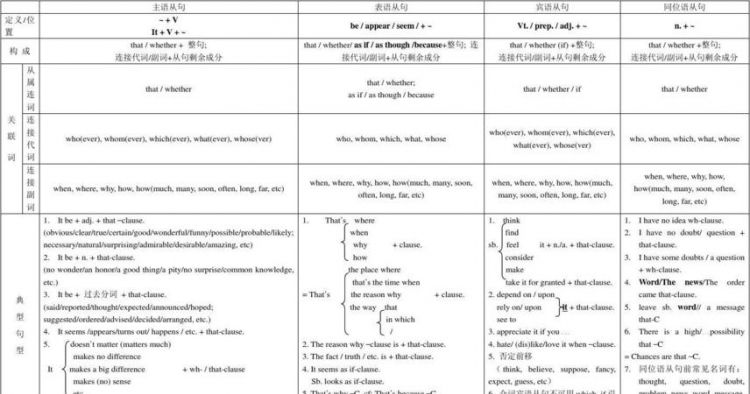
高中英语语法名词性从句课件
英语中 不乏大量的名词性从句。名词性从句是由名词和动词组成的一组单词。
名词是人的名字、动物、地点、事物或者一种状态,比如快乐hapiness或者兴奋excitement。
换句话说,名词就是某人或某物的称呼。
名词意味着名字
代词it, she, you, him, this等等可以取代名词。如果发现用一个代词可以取代一组单词,那么这组单词即为名词短语。我们来看下几个例子:
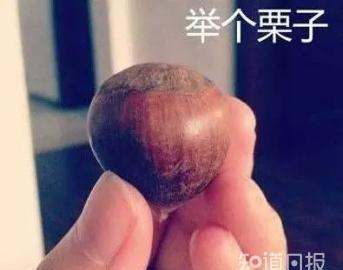 名词从句可以在句子中作主语、宾语或者补语。
名词从句可以在句子中作主语、宾语或者补语。
做主语:Whatever Taylor Swift sings becomes a hit.
It becomes a hit.
作宾语:Did you know that Taylor Swift is only twenty-five?
Did you know this?
作主语补足语:
Taylor Swift’s beauty and talent are what many girls dream of.
Taylor Swift’s beauty and talent are this.
名词从句通常可以通过对句子剩余部分提问来辨认。
比如说:
What becomes a hit? 答案即是whatever Taylor Swift sings
What did I know? 答案为:that Taylor Swift is only twenty-five?
What are Taylor Swift’s beauty and talent? 答案是:what many girls dream of.
明白了吗?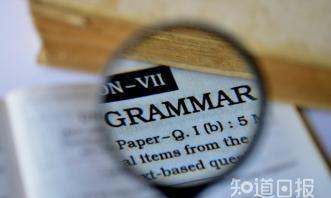
名词性从句很容易辨认,通常由以下词引导
that, if, whether,
what, when,how, where, 还有:
whatever,whenever, however.
You can tell me when it’s over if the high was worth the pain. 这句话里如何用this或it来替代句子成分呢?
这句话里包含了2个名词从句
1 You can tell me when it’s over
2. You can tell me if the high was worth the pain.
You can tell me ‘this’
待续。请继续关注Jason老师
想过你为什么没学好英语吗?
因为你没有真正的掌握英语学习的方法!
学英语不能输在起跑线上,
关注我们微信Jason-English8,学习别人不会告诉你的英语学习方法,真正的进入英语世界!
以上就是关于名词性从句用法规则 ,whether if在名词性从句的用法的全部内容,以及名词性从句用法规则 的相关内容,希望能够帮到您。
